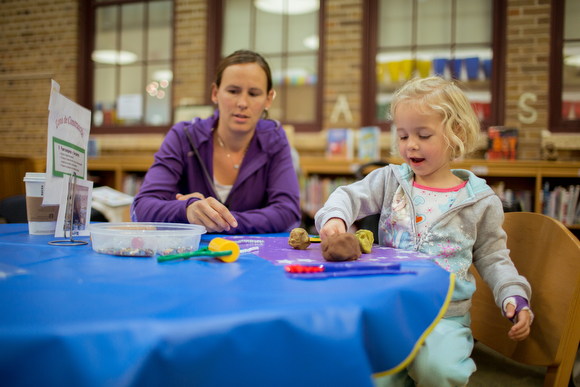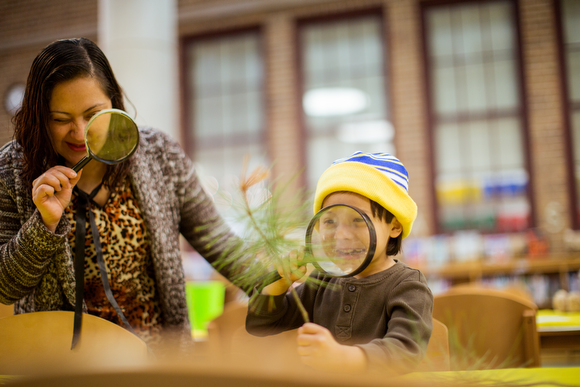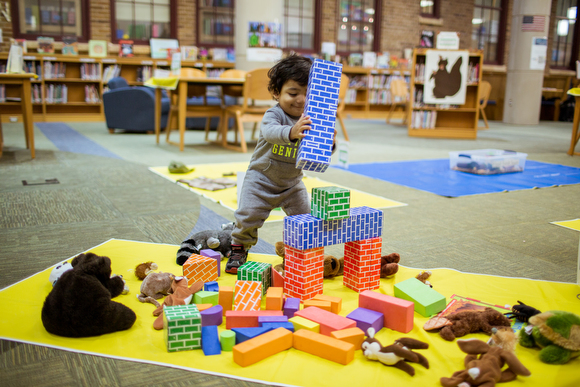Who couldn’t benefit from free parenting advice, tips on protecting a child from bullying or gang involvement, how to make a budget, save for college or become more physically active?
It’s only a click away at
Parent University, offered as an outreach of Grand Rapids Public Schools.
Parent University is in its second year and developed out of community and parent meetings focused on finding ways to increase parent involvement in the schools and at home and help students reach their full potential.
But Parent University also aims to give parents opportunities to develop leadership skills, continue their education and focus on their own personal growth. And it’s free to adults in the community, not just parents with children in Grand Rapids Public Schools.
“I personally think we have a great school district, if we work together and we learn together, it’s really empowering,” says Sue Garza, a GRPS parent who served on the parent steering committee. “Parents have a voice and we need to be heard and this is the best avenue. The more we learn and grow together, the better a community we will be. We had visitors from Taiwan come to see what we were doing.”
Parent University is a collaboration of
GRPS,
Believe 2 Become, a grant through the
Doug & Maria DeVos Foundation, and several other community organizations. Courses are offered in four core areas: effective parenting, personal growth, navigating education and health and wellness. Classes cover topics related to parenting, positive discipline, student achievement, applying for college and scholarships, goal setting, making a budget, bullying, gang activity and a host of other topics.

There are several parenting classes, including Parent Essentials – Dad’s and Mom’s edition, Parent Leadership 101, Leading Strong Families and more.
Parent University covers the spectrum of parenting, from infant to high school. There are Baby Scholars programs and Play and Learn groups for parents with toddlers and preschoolers, which started earlier this fall, designed to help parents with their child’s early development and school readiness. There are parent groups and other events and activities designed to give parents the tools to be better parents and take an active role in their child’s education.
Superintendent Teresa Weatherall Neal says about 1,000 parents participated during the 2013-14 year. She is excited to see it grow and pleased with the first-year results, especially with the harsh winter.
“I think my hope is it goes both ways,” Neal says. “Not only can parents learn a lot of information, I think parents have a lot to offer us. We can learn from them. This is a direct strategy connected to academic achievement. We do know a well-educated group of parents will only help us with students. You cannot educate students without working with parents. We want them to have a voice and we want to help them remove any barriers that may be in the way.”
The goal is to engage parents and familiarize them with the educational system, especially Spanish-speaking residents, as well as increase participation at parent-teacher conferences and volunteerism in the schools. Many courses are offered in English and Spanish.
Many Hispanic residents, single parents or young parents are busy working or not always aware of their responsibilities. This gives them extra support to help their child succeed in school, says Jan Wilkins, parent engagement coordinator for GRPS.
Classes also cover practical tips parents can apply when they go home that night, whether it’s helping children with their homework, learning about different parenting styles, and ways parents can uncover their child’s potential and inspire and influence their strengths, Wilkins says.

“We’re hoping having these classes will be able to help parents help these students achieve even more,” she says. “Just to make sure they understand the educational system, understand what is going on in schools and the expectations, the things that are different from elementary school to middle school.”
Organizers also hope parents take advantage of opportunities to better themselves, whether it’s by getting their GED, learning to make a budget or improving their health through nutrition classes, kickboxing or preparing to run a 5K.
“The long-term goal is to empower parents to be part of their own learning as well,” says Garza, who got involved through a friend and attended early planning meetings for Parent University.
“We’re just trying to help parents figure out how to go into their school and help a daughter or son succeed, how to start asking questions about health, how to figure out if your child is depressed.”
Garza has enrolled in several courses herself, including one about gangs and how to read the signs of gang involvement.
Some classes can be done online, or meet just once, while others, like Zumba and yoga and the parenting program Pailalen, “To Be in Peace,” take place weekly over several weeks.
Garza also serves as director of Cook Library Center, 1100 Grandville Ave., which hosts Parent University classes from time to time. This fall, it has been the site of the 13-week, Spanish-speaking parenting class
Pailalen, a violence prevention parent-training program of Wellspring Lutheran Services. It’s an example of the community-nonprofit-school partnerships also happening as a result of Parent University, and how organizers are trying to address barriers for parents, including transportation and child care.
“Our goal is to partner with schools and serve our community,” says Pailalen facilitator Yolanda Macias.
The Pailalen course at Cook covers a different topic each week. It meets for three hours and includes meals, carpooling, incentives for attendance and free child care, along with a companion curriculum for children while their parents are in class.
The class is also held in English at other locations and provides a prevention-intervention group experience for parents with children infant to age 18 to address violence against the self, violence in the family and violence against the community.

In 2012, several parent-leaders joined a more expansive planning team to create the framework and a comprehensive offering of classes for Parent University. This design team of parents, aided by Evolve!, Believe 2 Become, Grand Rapids Public Schools, LINC Community Revitalization, Kent School Services Network, and Creative Change Mission, spent more than 100 hours putting the details together for a 2013 fall launch.
There have been some adjustments to courses and times due to attendance challenges for parents, along with trying to get the word out about Parent University and launching a new website, Wilkins says.
Finding the time, as well as transportation and child care, are the biggest hurdles for parents, which is why some classes are now being offered online and at locations across the city, including schools, libraries and churches. GRPS also has developed some Power Parent tracks to improve attendance and achievement for students as well as parents’ participation in parent-teacher conferences and volunteering at their child’s school, Wilkins says.
“They will be able to in a leadership role in the school or be on focus groups used to lead other parents and other activities and events that are going on,” she says. “We want them to know what’s going on, to be part of the decision making and offer input on how to make their school better and safer, whether it’s safely getting back and forth, bullying issues, attendance issues.”
As articulated by the parents, the Parent University vision is to “Help parents be strong advocates of their children’s success.” The parent and community steering committee of Parent University welcomes everyone to join the ranks of Power Parents, helping children succeed.
“We really feel like we need to network and support parents,” Garza says. “We wanted to support and lift parents up for being good parents and not preaching what they’re doing wrong.”
Instructors are volunteers and professionals in the community who are willing to share their expertise.
“We don’t pay any of our instructors for teaching,” Neal says. “They are college instructors, business owners, board members; it’s really a collaboration with community members.”
Neal and Garza have taken a few classes and encourage parents, or even nonparents in the community, to give it a try. Tell a friend or bring a friend.
“Especially for parents who want to get involved, if they don’t know exactly how or where to start, if they’re nervous, start with one class, start talking to people,” Garza says. “We need help with so much. If you go to one class, bring a friend next time so we can keep growing this great opportunity.”
This article originally published in Rapid Growth, through a partnership with the Michigan Public Schools Partnership. Photography by Adam Bird.